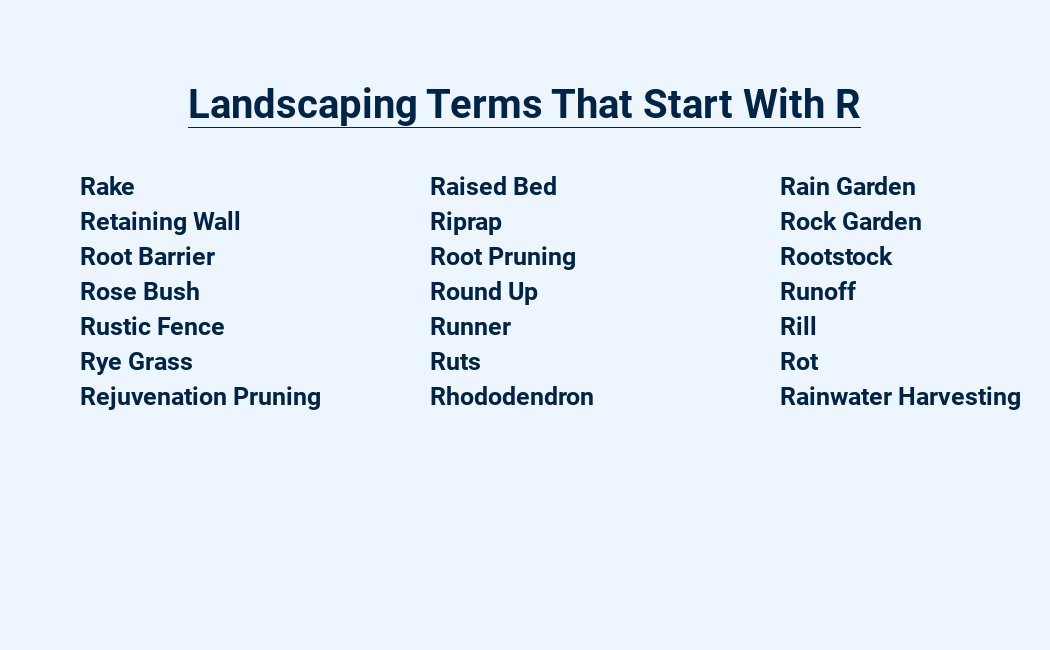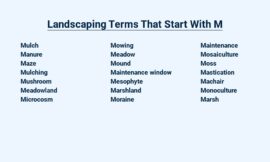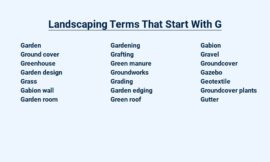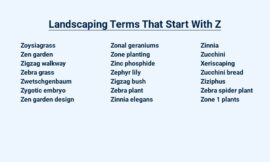In the realm of landscaping, a plethora of terms beginning with the letter “R” hold significance. From raised beds that elevate your garden’s aesthetics to retaining walls that tame unruly slopes, these concepts play a crucial role in shaping your outdoor oasis.
| Term | Description |
| Rain Garden | A landscaped area designed to collect and absorb rainwater, reducing runoff and filtering pollutants. |
| Raised Bed | A garden bed that is elevated above the surrounding ground, often used for vegetables or flowers. |
| Retaining Wall | A structure built to hold back soil or water, often used to create terraces or prevent erosion. |
| Rhizome | An underground stem that grows horizontally and sends out roots and shoots. |
| Rock Garden | A garden featuring rocks, often combined with plants that thrive in dry, rocky conditions. |
| Root System | The network of roots that anchors a plant in the ground and absorbs water and nutrients. |
Rake: A gardening tool with a toothed head used to gather or smooth loose material, such as soil or mulch.
Raised Bed: An elevated garden bed, often enclosed with a border of wood, brick, or stone, that allows for better drainage, easier maintenance, and improved soil conditions.
Retaining Wall: A structure built to hold back soil or other material on a hillside or slope, preventing erosion and creating a more stable landscape.
Rill: A small, narrow channel eroded by water flow, often found on slopes or in areas with poor drainage.
Rock Garden: A garden featuring rocks and stones as the primary decorative elements, often combined with drought-tolerant plants and minimal water requirements.
Root Pruning: The process of trimming or cutting back plant roots to control their growth, promote new root development, and improve plant health.
Rose Bush: A deciduous flowering shrub, known for its fragrant blooms in various colors, commonly grown in gardens and landscapes.
Rose of Sharon: A flowering shrub, also known as Althea, that produces showy, hibiscus-like flowers in various colors.
Roundup: A brand name for a systemic herbicide containing glyphosate, commonly used to control weeds in lawns, gardens, and agricultural fields.
Rubber Mulch: A garden mulch made from recycled rubber, such as old tires, which provides weed control, helps retain moisture, and prevents soil erosion.
Rhizomes: Underground stems that grow horizontally and produce new plants, often forming dense colonies.
Rachis: The central stalk or axis of a compound leaf, to which leaflets are attached.
Runner: A slender, horizontal stem that grows along the ground and produces new plants at its nodes.
Ripening: The process by which fruits and vegetables mature and become ready to harvest.
Rockery: A garden feature composed of rocks, stones, and boulders, often arranged in a naturalistic or decorative manner.
Rot: The decomposition of organic matter by microorganisms, resulting in the breakdown of plant tissues and the release of nutrients into the soil.
Roseate: A shade of pink, often associated with the color of roses.
Round Leaf Birch: A deciduous tree known for its round, lobed leaves and attractive bark, often used in landscaping.
Rubus: A genus of plants that includes blackberries, raspberries, and dewberries, commonly grown in gardens and orchards.
Rudbeckia: A genus of flowering plants known for their showy, daisy-like flowers in various colors, commonly used in gardens and landscapes.
Rhododendron: A genus of flowering shrubs and trees known for their showy, colorful blooms, commonly used in gardens and landscapes.
Rosette: A compact, circular arrangement of leaves or petals, often found in succulents and some flowering plants.
Rhizomatous Iris: A type of iris with rhizomes as its underground stem, forming dense clumps of foliage and flowers.
Rhizomatous Grasses: Grasses that spread by underground rhizomes, forming dense mats or colonies.
Rock Garden Succulents: Succulent plants that are adapted to growing in rocky, arid environments, often used in rock gardens and xeriscaping.
Rock Rose: A genus of flowering shrubs known for their showy, rose-like flowers, often used in rock gardens and Mediterranean-style landscapes.
Range: The natural geographic distribution of a species or plant community.
Redbud Tree: A small deciduous tree known for its showy, pink or purple flowers in the spring, commonly used in gardens and landscapes.
Landscaping Terms That Start With R
Raised Bed
A raised bed is an elevated garden bed constructed above ground level.
It is often used to improve soil quality, drainage, and accessibility, as well as to create a visually appealing focal point in a landscape.
Raised beds can be made from various materials such as wood, stone, or concrete blocks.
Retaining Wall
A retaining wall is a structure designed to hold back soil or other material. It is typically constructed of concrete, stone, or wood.
Retaining walls are used to create terraces, prevent erosion, and create level areas for patios or gardens.
Rill
Rill: A small, narrow channel eroded by flowing water.
Typically found on hillsides, rills can become deeper and wider over time, causing soil erosion.
Proper landscaping techniques can help control rill formation and protect soil integrity.
Rock Garden
Rock Garden A rock garden, also known as a rockery, is a garden that features rocks and stones as the primary decorative elements. These gardens are often designed to mimic natural landscapes, such as mountains, deserts, or riverbeds.
Rock gardens can range in size from small, contained areas to large, elaborate displays.
They are often used to add visual interest and texture to a landscape, and they can also provide a habitat for wildlife. When creating a rock garden, it is important to choose the right type of rocks and stones.
The rocks should be of varying sizes and shapes, and they should be arranged in a way that creates a natural and harmonious appearance.
It is also important to consider the type of plants that will be used in the garden. Plants that are drought-tolerant and can survive in rocky conditions are ideal for rock gardens.
Rock gardens can be a beautiful and unique addition to any landscape.
They are relatively easy to care for, and they can provide years of enjoyment.
Root Pruning
Root pruning is a technique used in horticulture to control the growth and spread of plant roots.
It involves severing selected roots to encourage the growth of new, more fibrous roots closer to the trunk or stem.
This can improve plant health and stability, especially in confined spaces like containers or urban landscapes.
Rose Bush
Rose bushes are beautiful and fragrant additions to any garden.
They come in a variety of colors, shapes, and sizes, making them perfect for any landscape.
Rose bushes require regular care, including pruning, fertilizing, and watering, but they are relatively easy to grow.
Rose of Sharon
Rose of Sharon is a popular ornamental shrub known for its showy, saucer-shaped blooms in various colors. It’s hardy, adaptable to different soil types, and thrives in full sun to partial shade.
Prized for its easy care and attractive foliage, the Rose of Sharon adds beauty to landscapes.
Roundup
Roundup, a popular herbicide, effectively eliminates unwanted vegetation. Its active ingredient, glyphosate, targets and disrupts the growth processes of plants, leading to their eventual death.
Roundup is commonly used in various landscaping scenarios, including weed control, lawn care, and garden maintenance.
Rubber Mulch
Rubber mulch, a playground and gardening material, is produced from recycled tires. It offers advantages such as improved drainage, weed suppression, and extended lifespan compared to traditional mulch options, making it a popular choice for landscapers and homeowners alike.
Final Verdict
In the world of landscaping, a plethora of terms beginning with the letter “R” play significant roles.
From the elevated aesthetics of raised beds and the structural integrity of retaining walls to the serene flow of rills and the beauty of rock gardens, these terms encompass a wide spectrum of elements that contribute to captivating outdoor spaces.
Additionally, techniques like root pruning ensure plant health, while rose bushes and rose of Sharon add vibrant colors and delicate fragrances.
Understanding these terms empowers homeowners and landscapers alike to create enchanting landscapes that thrive and inspire.




